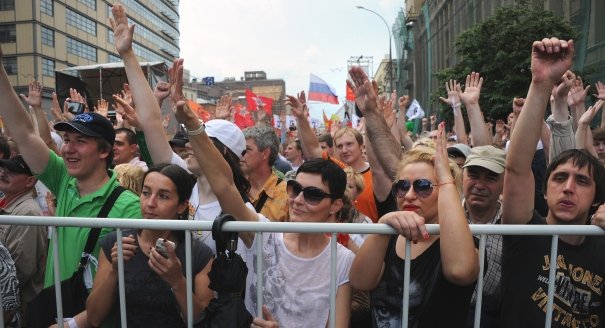Dmitri Trenin
{
"authors": [
"Dmitri Trenin"
],
"type": "commentary",
"centerAffiliationAll": "",
"centers": [
"Carnegie Endowment for International Peace",
"Carnegie Russia Eurasia Center"
],
"collections": [],
"englishNewsletterAll": "",
"nonEnglishNewsletterAll": "",
"primaryCenter": "Carnegie Russia Eurasia Center",
"programAffiliation": "",
"programs": [],
"projects": [],
"regions": [],
"topics": []
}
Source: Getty
National Democracy?
In the situation where no country can be an island, the best way forward for the democrats is to organize the more modern sections of the elites; to reach out to the broader publics on the issues that matter to the ordinary citizens; and to develop a set of credible policy alternatives—so that when the time comes, they can be ready.
Time magazine’s recent cover called the Egyptians “the world’s best protesters; the world’s worst democrats.” Indeed, the distance from toppling an authoritarian system to establishing a democratic order is a long and rough one. As many in Ukraine, Georgia, and Russia have learned, the advent of competitive elections does not equal immediate economic growth and universal prosperity. Over time, people have grown more skeptical toward an instant democratic cure, but there is a chance that they will become more mature as they learn to deconstruct democracy and see themselves as citizens, endowed with both rights and responsibilities.
Across the entire northern and central Eurasia, authoritarianism remains well-entrenched. In Minsk and Yerevan, Moscow and Astana, Baku and Tashkent, the local strongmen are in firmly control. This control, as Tom de Waal shows, allows the elites to reap the most benefits, while telling their subjects about the benefits of stability. These benefits look even more precious, as Alexey Malashenko points out, in the face of socio-political upheavals such as the Arab Spring. Yet, he adds, stability without development can lead to revolution.
Authoritarian rulers can draw legitimacy, for a period of time, from successful development, but they tend to succumb to their success in the end. South Korea is a shining example of that. Control without development, however, destroys the option of gradually achieving democracy through development, which Akio Kawato supports. Of course, there is another “evolutionary” option proposed by Olga Shumylo-Tapiola, which sees society itself, rather than the rulers, as the driving force of gradual change, but while it may be present in Ukraine, the tightening of control across the board in Russia, which both Lilia Shevtsova and Boris Makarenko note, blocks this path.
Ideological conservatism and self-insulation from foreign influence have become an instrument of choice for several authoritarian regimes, including Russia’s. To counter it, Lilia Shevtsova calls for the West to re-energize itself and take a more pro-active approach toward the authoritarians. Since any country’s foreign policy is seldom selfless, this leads to a potential conflict between the democratic and the national. Democrats seeking and accepting foreign assistance can be easily depicted as foreign agents, allowing the ruling authoritarians to lay exclusive claim to patriotism. In the situation where no country can be an island, the best way forward for the democrats is to organize the more modern sections of the elites; to reach out to the broader publics on the issues that matter to the ordinary citizens; and to develop a set of credible policy alternatives—so that when the time comes, they can be ready.
About the Author
Former Director, Carnegie Moscow Center
Trenin was director of the Carnegie Moscow Center from 2008 to early 2022.
- Mapping Russia’s New Approach to the Post-Soviet SpaceCommentary
- What a Week of Talks Between Russia and the West RevealedCommentary
Dmitri Trenin
Recent Work
Carnegie does not take institutional positions on public policy issues; the views represented herein are those of the author(s) and do not necessarily reflect the views of Carnegie, its staff, or its trustees.